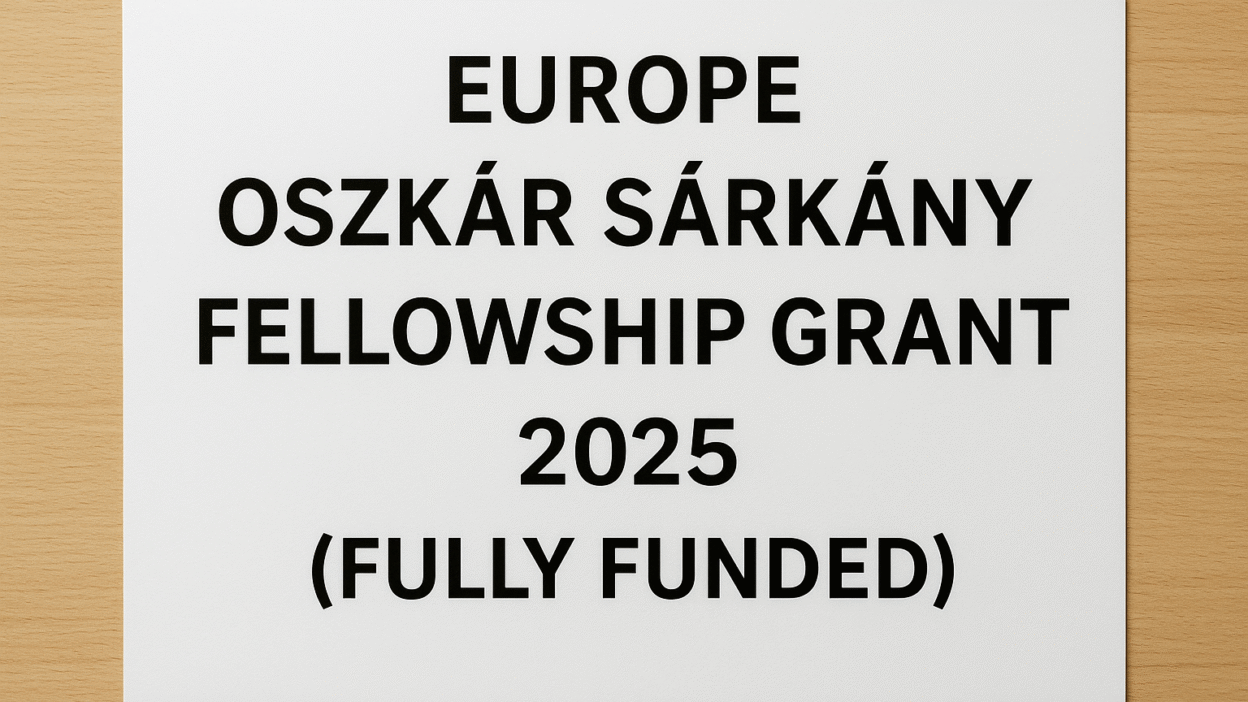The Europe Oszkár Sárkány Fellowship Grant 2025 (Fully Funded) is a distinguished mobility scholarship program for scholars in humanities and social sciences. Founded in memory of Oszkár Sárkány-Hungarian Bohemist, cultural historian, and champion of intellectual freedom- the fellowship both honors his memory and creates a unique chance for teaching and research exchange between Budapest and Paris.
In contrast to most research grants, however, this fellowship is not based on nationality but institution. Consequently, it invites applications from scholars belonging to the Central European University Institute for Advanced Study (CEU IAS) or CNRS SHS units of research. Furthermore, the program provides fully funded advantages with regard to accommodation, travel, and living costs, making it a desirable choice for early-career and senior researchers alike.
In the current academic setting, where finances are competitive and cross-border discussion ever more essential, the Oszkár Sárkány Fellowship is exceptional. In addition, it prioritizes academic freedom, reflects on the growth of illiberalism, and encourages critical debate with Central-Eastern European studies. As such, it offers not only financial assistance but also an opportunity for substantive intellectual exchange.
Who Was Oszkár Sárkány?
Before diving into the fellowship details, it’s important to understand the legacy behind the program’s name.
-
Born: 1912, Hungary
-
Expertise: Cultural history, Bohemistics
-
Contribution: Advocated for inclusive cultural history and opposed authoritarian ideologies.
-
Tragic End: Lost his life during World War II due to his opposition to authoritarian regimes.
The fellowship was launched to honor his commitment to scholarly freedom and intellectual resistance, continuing his vision of open academic dialogue across borders.
What Is the Europe Oszkár Sárkány Fellowship Grant?
The fellowship is a collaborative initiative between three institutions:
-
Central European University Institute for Advanced Study (CEU IAS) – Budapest
-
Paris Institute for Advanced Study (Paris IEA) – France
-
French Research Center in Humanities and Social Sciences (CEFRES) – Prague
Through this partnership, the fellowship promotes:
-
Mobility programs for CEU IAS fellows to Paris and CNRS SHS researchers to Budapest.
-
Cross-disciplinary research projects addressing critical issues in Central and Eastern Europe.
-
Academic networking opportunities across European research hubs.
-
Joint workshops and seminars for knowledge-sharing and public engagement.
Degree Level & Subjects
The Oszkár Sárkány Fellowship Grant 2025 supports fellowship-level programs at:
-
Austrian universities
-
French universities
-
Hungarian universities
Preferred Research Themes (2025–2026)
-
Central and Eastern Europe Studies
-
Illiberalism (local and global contexts)
-
Academic Freedom and Scholars at Risk
-
Invisible Universities and Alternative Education Models
This broad thematic approach encourages interdisciplinary exploration, bridging history, political science, sociology, and cultural studies.
Why Apply? – Key Benefits
The fellowship provides a comprehensive funding package and multiple academic advantages:
1. Full Financial Support
-
Travel, accommodation, and daily expenses fully covered.
2. Prestigious Recognition
-
Awarded under institutions renowned for academic excellence in Europe.
3. International Exposure
-
Research mobility between Paris and Budapest—two major European intellectual hubs.
4. Networking Opportunities
-
Collaboration with CEU, CNRS, and CEFRES researchers.
5. Timely Themes
-
Focus on urgent issues like academic freedom, authoritarianism, and illiberalism.
Fellowship Details & Timeline
The program is divided into two mobility tracks depending on institutional affiliation:
For CEU IAS Fellows (Mobility to Paris)
-
Call Opens: July 14, 2025
-
Deadline: September 15, 2025 (23:59 CET)
-
Results: September 30, 2025
-
Duration: 1 month (Spring 2026 suggested)
-
Benefits:
-
Accommodation at Cité Universitaire
-
Travel expenses
-
Daily allowance
-
For CNRS SHS Fellows (Mobility to Budapest)
-
Call Opens: July 20, 2025
-
Deadline: October 15, 2025
-
Results: October 25, 2025
-
Duration: 15 days (Spring 2026 suggested)
-
Benefits:
-
Accommodation at Wallenberg Guesthouse
-
Travel funded by CEFRES
-
Office space at CEU IAS
-
Participation in a joint workshop
-
Eligibility Criteria
Eligibility is institution-based, not nationality-based.
-
For CEU IAS Fellows (to Paris): Must be a 2024/25 or 2025/26 CEU IAS fellow.
-
For CNRS SHS Fellows (to Budapest): Must be a permanent member of CNRS SHS research unit.
Additional requirements:
-
Active research in humanities or social sciences.
-
Projects relevant to Central/Eastern Europe, illiberalism, or academic freedom.
-
Application submission in English or French.
Application Process
Applicants must prepare the following documents:
-
Motivation Letter (max 2 pages)
-
Academic CV with publications list
-
Submission via email to all three partners:
-
CEU IAS: Prof. Balázs Trencsényi
-
Paris IEA: Dr. William Berthomière
-
CEFRES: Dr. Mateusz Chmurski
-
Comparison: CEU IAS vs CNRS SHS Tracks
| Criteria | CEU IAS Fellows (Paris) | CNRS SHS Fellows (Budapest) |
|---|---|---|
| Duration | 1 month | 15 days |
| Accommodation | Cité Universitaire | Wallenberg Guesthouse |
| Funding | Travel + daily allowance | Travel + accommodation |
| Workshops | Collaborative opportunities | Mandatory joint workshop |
Case Study: Why This Fellowship Matters
A hypothetical CNRS researcher focusing on academic freedom in Eastern Europe could use this fellowship to:
-
Spend 15 days at CEU IAS Budapest collaborating with Hungarian scholars.
-
Gain access to archival materials unavailable in France.
-
Present findings in a joint workshop with CEU and CEFRES scholars.
-
Build long-term partnerships for EU-funded research grants.
This case illustrates how the fellowship not only supports short-term mobility but also seeds long-term academic collaboration.
Pros and Cons of the Fellowship
Pros:
-
Fully funded with no nationality restrictions.
-
Unique mobility between Budapest and Paris.
-
Strong institutional support from CEU, CNRS, and CEFRES.
-
Focus on timely, socially relevant research themes.
Cons:
-
Eligibility limited to CEU IAS and CNRS SHS fellows only.
-
Short duration (1 month or 15 days) may limit depth of research.
-
Competitive application process.
FAQs
1. Can early-career researchers apply?
Yes, both early-career and senior researchers are welcome if they are affiliated with CEU IAS or CNRS SHS.
2. What expenses are covered?
Travel, accommodation, and daily allowances are fully funded.
3. Are non-European nationals eligible?
Yes, nationality does not matter—only institutional affiliation.
4. What languages are accepted?
Applications must be in English or French. Working proficiency in local languages is helpful but not required.
5. How competitive is the fellowship?
Highly competitive, as it is open only to CEU IAS fellows and CNRS SHS researchers.
6. Can research topics be outside the preferred themes?
Topics must be relevant to Central/Eastern Europe, illiberalism, or academic freedom.
7. What is the expected output?
Participation in workshops, research sharing, and potential publications.
8. Is the fellowship renewable?
No, it is a one-time mobility grant.
9. What is the main difference between the Paris and Budapest tracks?
The Paris track lasts 1 month, while the Budapest track lasts 15 days.
10. How are results announced?
Via email shortly after the deadline—September 30 for CEU fellows, October 25 for CNRS fellows.
Conclusion
The Europe Fellowship Grant 2025 is more than just a funded research opportunity; rather, it represents a strong commitment to academic freedom, transnational collaboration, and intellectual resistance against illiberalism. Therefore, scholars affiliated with CEU IAS and CNRS SHS should recognize the value of this chance and seize the moment to expand their research horizons in Paris or Budapest.
In addition, the fellowship not only provides financial support but also fosters meaningful dialogue across borders. Consequently, participants will gain international exposure while contributing to urgent debates in the humanities and social sciences.
📌 Call-to-Action: If you are eligible, now is the right time to begin preparing your application carefully. Moreover, ensure that your proposal aligns closely with the fellowship’s research themes. Ultimately, this could be your pathway to advancing research, strengthening collaborations, and honoring the inspiring legacy of Oszkár Sárkány.


